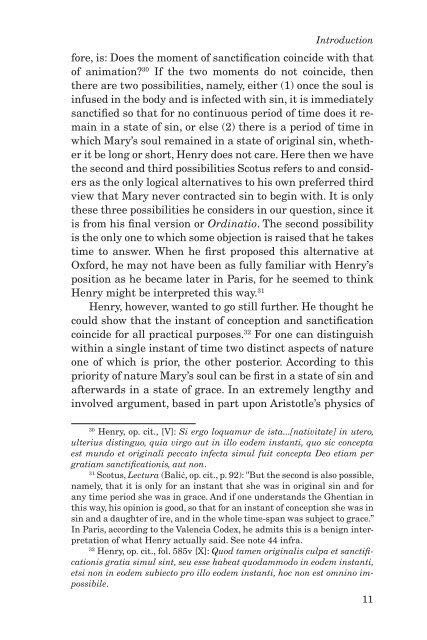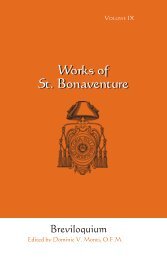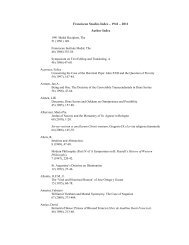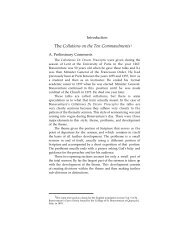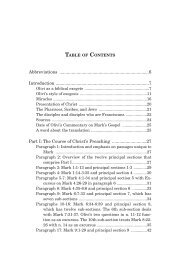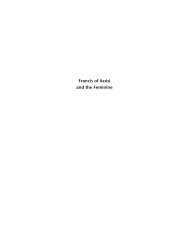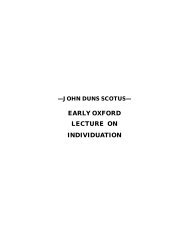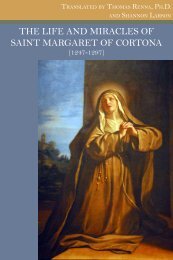FOUR QUESTIONS ON MARY - Franciscan Institute Publications
FOUR QUESTIONS ON MARY - Franciscan Institute Publications
FOUR QUESTIONS ON MARY - Franciscan Institute Publications
You also want an ePaper? Increase the reach of your titles
YUMPU automatically turns print PDFs into web optimized ePapers that Google loves.
Introduction<br />
fore, is: Does the moment of sanctification coincide with that<br />
of animation? 30 If the two moments do not coincide, then<br />
there are two possibilities, namely, either (1) once the soul is<br />
infused in the body and is infected with sin, it is immediately<br />
sanctified so that for no continuous period of time does it remain<br />
in a state of sin, or else (2) there is a period of time in<br />
which Mary’s soul remained in a state of original sin, whether<br />
it be long or short, Henry does not care. Here then we have<br />
the second and third possibilities Scotus refers to and considers<br />
as the only logical alternatives to his own preferred third<br />
view that Mary never contracted sin to begin with. It is only<br />
these three possibilities he considers in our question, since it<br />
is from his final version or Ordinatio. The second possibility<br />
is the only one to which some objection is raised that he takes<br />
time to answer. When he first proposed this alternative at<br />
Oxford, he may not have been as fully familiar with Henry’s<br />
position as he became later in Paris, for he seemed to think<br />
Henry might be interpreted this way. 31<br />
Henry, however, wanted to go still further. He thought he<br />
could show that the instant of conception and sanctification<br />
coincide for all practical purposes. 32 For one can distinguish<br />
within a single instant of time two distinct aspects of nature<br />
one of which is prior, the other posterior. According to this<br />
priority of nature Mary’s soul can be first in a state of sin and<br />
afterwards in a state of grace. In an extremely lengthy and<br />
involved argument, based in part upon Aristotle’s physics of<br />
30 Henry, op. cit., [V]: Si ergo loquamur de ista...[nativitate] in utero,<br />
ulterius distinguo, quia virgo aut in illo eodem instanti, quo sic concepta<br />
est mundo et originali peccato infecta simul fuit concepta Deo etiam per<br />
gratiam sanctificationis, aut non.<br />
31 Scotus, Lectura (Balić, op. cit., p. 92): "But the second is also possible,<br />
namely, that it is only for an instant that she was in original sin and for<br />
any time period she was in grace. And if one understands the Ghentian in<br />
this way, his opinion is good, so that for an instant of conception she was in<br />
sin and a daughter of ire, and in the whole time-span was subject to grace.”<br />
In Paris, according to the Valencia Codex, he admits this is a benign interpretation<br />
of what Henry actually said. See note 44 infra.<br />
32 Henry, op. cit., fol. 585v [X]: Quod tamen originalis culpa et sanctificationis<br />
gratia simul sint, seu esse habeat quodammodo in eodem instanti,<br />
etsi non in eodem subiecto pro illo eodem instanti, hoc non est omnino impossibile.<br />
11


